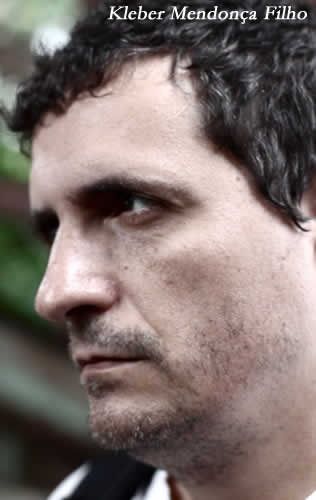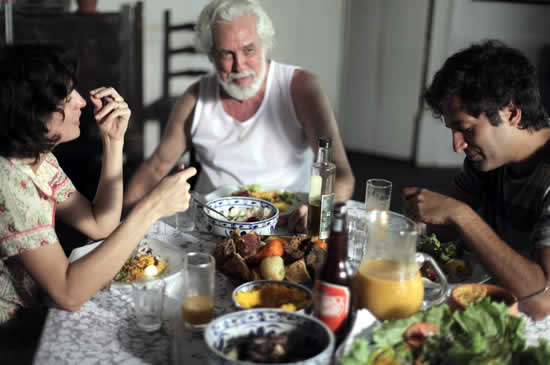 A palpable sense of unease hangs over a single city block in the coastal town of Recife, Brazil. Home to prosperous families and the servants who work for them, the area is ruled by an aging patriarch and his sons. When a private security firm is reluctantly brought in to protect the residents from a recent spate of petty crime, it unleashes the fears, anxieties and resentments of a divided society still haunted by its troubled past.
A palpable sense of unease hangs over a single city block in the coastal town of Recife, Brazil. Home to prosperous families and the servants who work for them, the area is ruled by an aging patriarch and his sons. When a private security firm is reluctantly brought in to protect the residents from a recent spate of petty crime, it unleashes the fears, anxieties and resentments of a divided society still haunted by its troubled past.
Kleber Mendonça Filho, director of Neighboring Sounds, was born in 1968 in Recife, Brazil. He graduated with a degree in journalism and has worked extensively as a film critic as and as the programmer of Recife’s top alternative cinema. In the 90s he made documentaries, experimental films and fiction. Over the last decade, his short films have won over 100 awards in Brazil and abroad, with selections in Karlovy-Vary, BAFICI, Rotterdam, Recontres Cinemas D’Amerique Latine de Toulouse, Clermont-Ferrand and Cannes. His first feature, the documentary Critico, focused on the troubled relationship between filmmakers and critics through a personal series of interviews recorded over a period of eight years. Neighboring Sounds is his first fictional feature.
Bijan Tehrani: What inspired you to make Neighboring Sounds?
Kleber Mendonça Filho: I think I am interested in watching and making films that are an artistic version of reality. It’s not 100% realistic but it’s realistic enough for people to recognize society, actions, and the way people behave. It’s more interesting for me when the film gives you a slightly distorted point of view on something real. Most times in cinema, not just Brazilian cinema, things are really clear cut: it’s either realistic or fantasy/science fiction. I felt like making a film with both feet on the ground but with a slightly off-the-wall, crooked attitude. I have been making short films for the past ten to fifteen years, and some themes come back; my short films are a bit like fragments of Neighboring Sounds, while there are of course new fragments in Neighboring Sounds.
Another thing is I come from this part of Brazil with a peculiar history, especially with slavery. I think we still have slavery in our DNA, in our way of life and the way the city behaves and culture behaves in this part of the world. It’s the case all over Brazil but particularly in Pernambuco, where I come from. I happen to notice a lot of situations in my daily life that seem to be invisible to most people, but I’ve always felt very strongly about this. So I always wanted to make a film about a normal middle-class street which would double for a former sugar cane plantation, a slave farm in the late XIXth century. I wouldn’t tell anyone about this and disguise a lot of elements, and the social roles in the film. Maybe you have to be Brazilian to see this. So, those two ideas are what inspired me to make the film.
BT: I personally feel it relevant to what is happening around the world; I don’t find it specifically Brazilian, I could imagine it in my home country, Iran, or in L.A. because your film is like slices of life. You manage to see a lot, instead of concentrating on one character or one part. The way the different sequences are cut, we have more of a chance to witness real life. Was this intentional?
KB: It’s all a big surprise because I went to Rotterdam to show the film for the first time. I just made the best film I could make, and then I began to get these reactions to the film, and people from different places seem to understand the film very well, even if they don’t understand it as a Brazilian. They understand in maybe more interesting ways. This is fascinating! The film has been teaching me for over a year. It’s made me very happy and humble because I did my best work and then the film became a kind of bacteria: it becomes organic and people react to it in different ways.
BT: How much did your background as a film critic affect your work as a director?
KB: I’m not sure because today there are so many ways to learn about cinema. When I was growing up, there was no internet, so I had to go to the cinema, get VHS tapes and buy books and magazines. What I mean to say is you don’t need to be a film critic to make good films. If you have talent and you are able to look for information and make the best of it, you can make a good film. This question ignores that I have a very personal relationship with cinema. I was a film critic and watched a lot of films, and wrote about them. It may be important but I don’t think people who weren’t critics are at a disadvantage.
 BT: I am asking because sometimes film critics will become filmmakers, and have more influences from filmmakers.
BT: I am asking because sometimes film critics will become filmmakers, and have more influences from filmmakers.
KB: There are strong influences from many filmmakers in my work but I try not to have the “Hitchcock scene” or the “Kiarostami scene”. The references should turn into your own. You can see where it came from but it should be natural and organic, and that only happens when you understand the original scene to make it your own. It’s like telling a joke, you have to tell it your own way. You don’t have to be a film critic to carry influences because we have all seen so many films. But I do think that often film critics go over to filmmakers, but a number of times it doesn’t work because they are too cerebral about the process. There’s a moment when you do what you have to do and feel it rather than think about it. Maybe that is one identifiable problem, except of course for the Nouvelle Vague filmmakers like Truffaut, Godard and Rohmer. They were talented, they had it in them. Paul Schrader, who wrote Taxi Driver, when he started hadn’t seen many films, he only became interested in cinema around 17 or 18, which is a bit rare. So everyone has a different way.
BT: Your characters stay mostly in a gray area – they are not all positive or negative but human beings. How did you deal with your characters?
KB: A little bit like I treat people in life: I try not to judge them, which immediately makes an extra-terrestrial out of you because society is always judging people and profiling people. Commercial cinema does this all the time. You have the gay character who is funny, the woman who has a sex life is painted as a slut who is going to die violently… And I don’t like that… I just said that some people make films in a cerebral way but of course it’s impossible not to think about some aspects when you’re making a film. I kind of understand what audiences expect when they are watching a film. For example Bia, the housewife in the film, she has two kids and throughout most of the script, she is probably the nicest person in the script, and I was tempted to stand by her side and latch on to her. She was my reservoir of sympathy, but towards the end of the film, she has this ugly screaming argument with her maid, and I thought it was important to have this scene, to show that she is nice but she has moments when she is not so nice. When you do a portrait, I think it should never be perfect, it has to be realistic.
BT: How did you go about casting for the film?
KB: We received a lot of submissions. It’s a great process because I get to meet a lot of people. Of course, it’s not a typical way to meet people, because you’re meeting people who very much want to be part of the film so maybe there is a situation of disadvantage but I love looking at the way they talk, admiring their emotional intelligence, their points of view on society and people, discovering faces. And that’s what I did for two months! Slowly, I found some people I found interesting and some of them are not even professional actors – they’re all actors though. Ever since I’ve started showing the film, I’ve disliked the term “non-professional actor” because it sounds kind of aggressive to me now. They don’t make a living out of it but they are actors. Other faces I found happen to be “professional actors”. I am very happy with the result and even happier with the way they see the film. They are very proud of what they did in the film.
BT: In one part of Neighboring Sounds, you can hear Jafar Panahi. Please tell us about that scene.
KB: I made a documentary released in 2008 – I think it’s on Amazon streaming videos – which is basically nine years of interviews that I made with film critics and filmmakers about their love/hate relationship since the beginning of time. And I put together this documentary, which is a very personal film, about my previous job, and one of the people I interviewed was Jafar Panahi, interviewed in Slovakia. The part I used of Jafar in the film is about censorship. Of course, I understand he is currently under house arrest in Iran. I find the part I used in the film very meaningful; he basically says that censorship is a bizarre form of criticism and goes on to discuss it; he says it’ s almost a way of saying you are right and you should keep doing what you are doing, because if somebody is upset enough to censor you and cut your right to speech, it’s because you are doing right. I thought this should be in the film. He was already under house arrest when I made the film. In a year and four months, three people reacted to that, all Iranians in international film festivals.
BT: Are you working on any projects right now?
KB: I have two scripts that are still in the early stages of development, so it’s not very comfortable for me to talk about them. But Neighboring Sounds is still giving me a lot of work, and I wonder what it will be like because it’s already been a year and four months! I’m not complaining but it’s still a lot of work. I just arrived in L.A. and I’ve had one screening, I have one on Friday, on Saturday, all with Q&As. Sunday, there is a panel discussion. I enjoy that but it is work.

